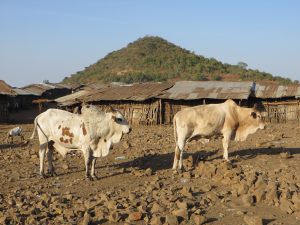ESSP Working Paper 137, by Joachim Vandercasteelen, Bart Minten, and Seneshaw Tamru.
Abstract: This paper explores the spatial heterogeneity in dairy production in the highland production area around the capital of Ethiopia, Addis Ababa. We look at how urban proximity – defined as the travel time from the farm to the central market of Addis Ababa – affects the production decisions of Ethiopian dairy farmers. We sampled 870 households from the major rural production zones around Addis Ababa, where villages were stratified according to their distance to Addis Ababa. Using an instrumental variable approach, we find evidence of strong spatial heterogeneity in dairy milk productivity in Ethiopia. With each additional hour of travel time, the milk productivity per cow is reduced by almost 1 liter per day, a reduction by 26 percent on average. This spatial heterogeneity in milk productivity reflects a pronounced spatial variation in dairy production decisions (producing liquid milk or processed dairy products), the application of modern inputs, and marketing. When trying to disentangle the mechanisms through which urban proximity affects dairy productivity, we show that the effect of travel time mainly runs through farmers’ inclusion into ‘modern’ value chains and more specifically through their access to commercial milk buyers. This finding holds when we control for prices, indicating that access to commercial value chains are an important determinant of dairy productivity. However, as only a limited number of farmers now have access to such value chains in these settings, measures to make dairy value chains more inclusive to remote farmers can have important economic development benefits for them. Download the PDF.
